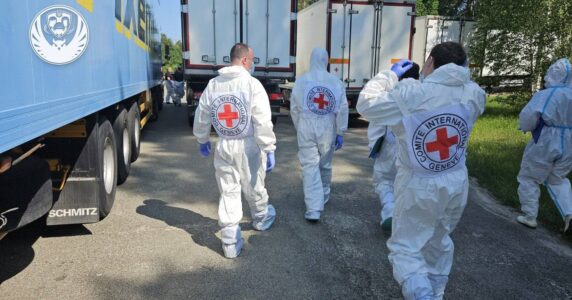Navigation and useful materials
The U.S. Senate has approved a resolution calling on the State Department to designate the Russian Federation as a state sponsor of terrorism. If the U.S. does it, Russia will face further isolation and new sanctions that will strengthen the detrimental effect of the restrictions already in place.
There have been precedents when countries were included on this list and subjected to severe economic and political sanctions by the United States. This article explains what kind of restrictive measures will be taken, to which countries the U.S. have already assigned this status, and what risks it may entail.
What is a state sponsor of terrorism?
There in no single definition of “terrorism” in international law. The UN most often defines it as “use of violence to create a general climate of fear and terror.”
The United States of America uses the term “state sponsor of terrorism” instead. These are stated which repeatedly provided support for acts of international terrorism&
Designating a state as a sponsor of terrorism is one of the most powerful tools in the US arsenal. Earlier this measure was applied only as a last instrument and only to pariah states that were poorly integrated in the world economy.
The U.S. created the first list of state sponsors over 40 years ago, back in 1979, including Libya, Iraq, South Yemen, and Syria on it. The current version of this “blacklist” has four countries on it, namely Cuba, North Korea, Iran, and Syria.
These countries have become international outcasts. Their aggressive policies have tarnished their reputations. Not a single one of these countries can boast economic growth or achievements in other areas.
Russia, like the Soviet Union, was not recognized as a state sponsor of terrorism after the annexation of the Ukrainian Crimea, after the shooting down of Malaysia Airlines passenger flight MH17 in Donbas in 2014, after Russia’s support for the regime of Bashar Assad and the war in Syria, or during the Cold War, when Moscow had supported terrorist groups in the 1970s and 1980s.
What sanctions will be imposed on a state sponsor of terrorism?
The United States imposes several categories of sanctions on state sponsors of terrorism. Firstly, the status places restrictions on U.S. foreign assistance (including financial aid). Secondly, defense exports and sales are banned. The third category includes financial restrictions (for example, the United States may oppose loans to such countries by the World Bank or other international financial institutions). The fourth is certain controls over exports of dual-use items. This can be a wide list of items, starting with certain metals and ending with sensors, chips and drones. Every item that can be used for both peaceful and military aims can be under the ban.
Moreover, the U.S. can freeze the property of a “terrorist” country or remove diplomatic immunity from its representatives.
Another lever, and perhaps the most important one for a terrorist state’s global isolation, is that the designation allows the U.S. to penalize other countries engaging in trade with the “terrorist.” This restriction is also the most sensitive. After all, Russia, unlike the states that have already been recognized by the USA as sponsors of terrorism, has a lot of economic ties.
Will designating Russia as a state sponsor of terrorism affect it?
Russia has already become the world’s most-sanctioned country with more sanctions in place than on Iran, Syria, or North Korea.
The total number of international sanctions against Russia exceeds 10 thousand, with 7 thousand imposed after its full-scale invasion of Ukraine in February 2022.
That is why designating Russia as a state sponsor of terrorism is, to a certain extent, a symbolic step. After all, multiple strict sanctions are already in place. The United States of America has repeatedly emphasized that it has already imposed a number of sanctions on Russia similar to those used against sponsors of terrorism. For example, the arms export ban and financial restrictions are already in place. In addition, Russia (for obvious reasons) does not receive any foreign aid from the US.
Nevertheless, the status of a terrorist state is still bound to take its toll on Russia, particularly reputation-wise. The world will finally start calling it what it is. International businesses, which have been fleeing the Russian Federation for the past five months, will not return there. The sanctions can also undermine the only lever of influence Russia still has on the world, which may question the export of energy carriers from such an unreliable partner. And any efforts to redirect oil and gas supplies from Europe, where a total ban is becoming more and more probable, to China and India, for example, can finally put a stop.
What has so far prevented the U.S. from designating Russia as a state sponsor?
There have been calls to recognize Russia as a terrorist state since 2014. Now, five months into the full-scale war in Ukraine, the matter is back on the agenda. What is it that still keeps the U.S. wary about it?
Firstly, the sanctions will affect other countries with which the state sponsor of terrorism is trading. This means that the U.S. must carefully calculate the potential impact. After all, Russia has a greater economic influence on its partners than, say, North Korea or Iran. It will take some time.
Secondly, designating Russia as a state sponsor may make it harder to use frozen Russian assets for compensating Ukraine. Especially in the wording that the Senate is currently using in the resolution. After all, it is about condemning not only Russia’s invasion of Ukraine, but also the actions of the Russian Federation in Chechnya, Georgia, Libya, Syria and Sudan.
But here is the catch: only a very limited class of plaintiffs may sue — specifically, U.S. nationals, service members and government employees. It would allow Americans (for example, relatives of former US soldiers who were killed in Ukraine) to recover from the frozen assets, but not Ukrainians (or Libyans or Syrians or Georgians) who have suffered from Putin’s brutal conduct.
Here’s something of a conclusion. It is true that Washington must consider all the risks associated both with the economic impact on other countries and the benefits of sanctions for Ukraine. It is crucial, however, that the civilized world stays on track to bring guilty parties to justice for the aggressive war and for thousands of its victims.
If you have found a spelling error, please, notify us by selecting that text and pressing Ctrl+Enter.


